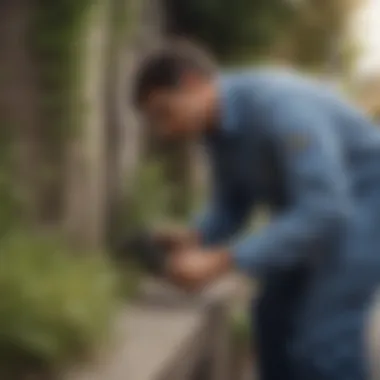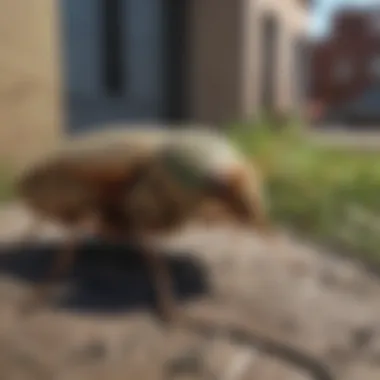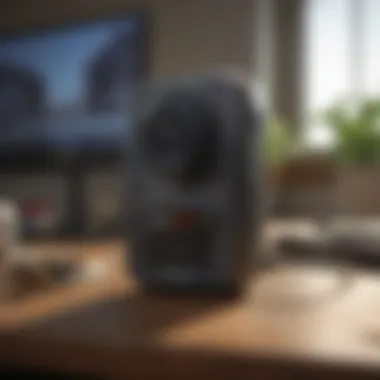Understanding ABC Pest Control: Methods and Trends


Intro
In urban settings like Des Moines, effective pest control is essential for maintaining a healthy living environment. Homeowners face various pest challenges, and understanding these issues is the first step toward effective management. This article focuses on the practices and methodologies utilized by ABC Pest Control in Des Moines, offering invaluable insights into pest identification, prevention methods, and DIY solutions.
Pest Identification
Identifying pests is crucial to managing infestations before they escalate. Recognizing the signs can help homeowners take preventive measures early on.
Common Household Pests
In Des Moines, the most frequently encountered household pests include ants, cockroaches, rodents, and termites. Each of these pests poses unique threats to health and property:
- Ants: They may invade kitchens in search of food.
- Cockroaches: Known carriers of diseases, they prefer dark and moist environments.
- Rodents: Mice and rats can damage property and contaminate food.
- Termites: These can silently destroy the structures of a home.
Understanding the specific characteristics of these pests aids in timely identification and eradication.
Signs of Infestation
Homeowners should be vigilant for early signs of pest problems. Some common indicators include:
- Droppings near food sources or nesting areas.
- Unusual sounds, such as scratching or scurrying at night.
- Damaged structures or furniture, especially in the case of termites.
- Visible nests or trails.
These signs often signal a need for immediate action to prevent further damage.
Prevention Methods
Preventing pest infestations is often more effective than treating them. Simple modifications and maintenance can greatly reduce risks.
Environmental Modifications
Adjustments to the environment can create a less hospitable space for pests:
- Seal cracks and crevices: Reduce entry points by sealing gaps around windows and doors.
- Manage moisture: Fix leaks and reduce humidity levels, as many pests thrive in damp conditions.
- Landscape smartly: Keep plants trimmed and away from the home, as they can harbor pests.
These measures can significantly deter pest invasions.
Home Maintenance Tips
Implementing regular home maintenance routines also plays a key role in prevention:
- Routine inspections: Regularly check for signs of pests and address them quickly.
- Proper waste disposal: Keep bins covered and take out the trash regularly.
- Food storage: Store food in airtight containers to eliminate food sources for pests.
DIY Pest Control Solutions
For some homeowners, taking matters into their own hands can be both effective and economical. However, it is important to approach DIY pest control thoughtfully.
Natural Remedies
Many natural solutions can help deter pests without the need for harsh chemicals:
- Essential oils: Oils such as peppermint and lavender can repel many insects.
- Vinegar and water: A simple solution can clean surfaces and deter ants.
These remedies are environmentally friendly and reduce the risk of chemical exposure.
DIY Traps and Barriers
Creating traps and barriers at home can also help control pest populations:
- Glue traps: These can effectively capture small pests like rodents.
- Physical barriers: Installing screens on doors and windows limits pest entry.


"Implementing preventive measures is more efficient and cost-effective than reactive treatments."
In summary, understanding the nuances of pest control equips homeowners with the knowledge to address pest issues proactively. Stakeholders such as ABC Pest Control in Des Moines offer professional insights that can further enhance these efforts.
Intro to Pest Control
Pest control plays a crucial role in maintaining a healthy living environment. It helps prevent various issues ranging from property damage to serious health hazards. In urban areas like Des Moines, the challenge of managing pests becomes even greater. The combination of dense housing and available food sources attracts various species of pests that can disrupt daily life. Understanding pest control helps residents make informed decisions about maintaining their homes.
Effective pest management requires knowledge of the local ecosystem, habits of common pests, and the principles behind different control methods. Homeowners benefit significantly from pest control as it prevents infestations, preserves property values, and ensures a safer environment for families. Without proactive measures, pests can multiply rapidly, leading to greater challenges down the line.
Using the right pest control strategies is essential for long-term success. Techniques can range from chemical treatments to more natural methods like biological control. Keeping this in mind, it's important for homeowners to be aware of the options available to them. This article focuses on ABC Pest Control in Des Moines, exploring their practices and how they can aid the community in managing pest problems effectively.
The Importance of Pest Control
Understanding the importance of pest control begins with recognizing its impact on health and safety. Pests such as rodents and insects can transmit diseases, which pose significant risks to inhabitants. Additionally, some pests can cause considerable damage to homes, necessitating costly repairs. Preventive pest control measures are thus vital for prolonging the life of a property and safeguarding its residents.
Another key point is that effective pest management can enhance comfort in the home. Pests often lead to distractions and discomfort, creating an unwelcoming living space. By understanding pest control, homeowners can invest in timely interventions and avoid larger issues arising from negligence.
Overview of ABC Pest Control
ABC Pest Control is a well-established service in Des Moines, renowned for its commitment to effective pest management solutions. The company utilizes a combination of methods to address various pest issues. Their approach includes both traditional and innovative techniques to cater to the needs of a diverse clientele.
Specializing in common pests like rodents, insects, and termites, ABC Pest Control employs trained professionals who are knowledgeable about local pest behavior. They offer customized service plans that align with the specific needs of each homeowner. Their methods not only focus on elimination but also on prevention, reducing the likelihood of future infestations.
With a focus on eco-friendly practices, ABC Pest Control is dedicated to protecting the environment while serving the community. This commitment resonates with clients seeking sustainable solutions. The company is also familiar with local regulations, ensuring that all methods used comply with state guidelines.
"Effective pest management is not just about eradication but creating a balanced environment for both people and nature."
Pest Control Methods
Pest control is a critical aspect of maintaining a safe and healthy living environment. Understanding the methods available for pest management allows homeowners to make informed decisions about how to protect their homes from unwanted intruders. Effective pest control methods not only eliminate pests but also prevent future infestations. The right choice can reduce health risks, save money, and contribute to overall peace of mind.
Chemical Treatments
Chemical treatments are among the most traditional forms of pest control. These involve the use of pesticides to eliminate pests from an area. The advantages of chemical treatments include their immediate effectiveness. Homeowners often see rapid results when using these products. Common pesticides include those containing active ingredients such as pyrethroids or neonicotinoids, which target specific pest species.
However, it is important to use these chemicals responsibly. Over-reliance can lead to resistance among pest populations and raise health concerns for families and pets. Proper application, following guidelines, is essential to minimize risks. Homeowners need to read labels carefully and ensure they are using products designed specifically for their pest problem.
Biological Control Strategies
Biological control strategies focus on using natural enemies of pests to manage populations. This can include predators, parasites, or pathogens that specifically target pest species. For example, introducing ladybugs can help control aphid populations. This method is becoming more popular as it aligns with sustainable practices.
One of the key benefits of biological control is its potential to reduce chemical usage. This can make it a more environmentally friendly option. Such strategies foster a balance in the ecosystem and can prove to be effective in the long-term pest management plan. However, a deep understanding of both the pest's and the predator’s life cycles is necessary for successful implementation.
Integrated Pest Management (IPM)
Integrated Pest Management, or IPM, is a comprehensive approach that combines various pest control strategies to minimize risks and achieve effective management. It emphasizes prevention and relies on monitoring pest populations to determine when intervention is necessary.
IPM promotes understanding the pest problem, assessing potential risks, and evaluating control options before taking action. Methods utilized in IPM may include cultural practices, physical barriers, and chemical treatments as a last resort. This method allows homeowners to control pests while minimizing environmental impact.
By understanding and employing these pest control methods, homeowners in Des Moines can lead more effective pest management efforts. This not only protects their homes but also contributes to a healthier community.
Common Pests in Des Moines
The issue of pests in Des Moines is critical for homeowners and businesses alike. Pests not only cause inconvenience but can also damage properties and pose health risks. Understanding the common pest problems in this area is essential for effective management and prevention strategies.
Rodents
Rodents are a prevalent concern in Des Moines. Species such as rats and mice often invade homes seeking food and shelter. Their rapid reproduction rate can lead to significant infestations if not addressed promptly. Rodents can also transmit diseases, contaminating food supplies and surfaces.
To manage rodent problems, homeowners should seal cracks and openings in buildings, maintain cleanliness, and store food in airtight containers. Utilizing traps is necessary to eliminate established populations. It is advisable to contact ABC Pest Control for professional help, which offers tailored solutions to effectively handle rodent infestations while ensuring the safety of residents.


Insects
Insects represent another major pest category in Des Moines. Common insects include ants, cockroaches, and mosquitoes.
- Ants can invade homes in search of food and become persistent once they establish a colony. Managing ants often involves identifying their entry points and using bait or barrier methods.
- Cockroaches are hardy insects that thrive in humid environments. Their presence indicates poor sanitation and can pose health risks by spreading allergens and pathogens.
- Mosquitoes can disrupt outdoor activities and are vectors of diseases like West Nile virus. Managing mosquito populations involves eliminating standing water and applying insecticides when necessary.
Addressing insect problems early can minimize their impact on health and property. Employing ABC Pest Control services can provide comprehensive management plans tailored to specific insect issues, ensuring pest populations are kept in check.
Termites
Termites are a serious concern for homeowners in Des Moines due to their destructive feeding habits. Often referred to as "silent destroyers," termites can cause significant structural damage without immediate detection. They primarily feed on cellulose, found in wood, paper, and other building materials.
Preventive measures involve regular inspections of wooden structures and taking steps to reduce moisture levels in and around the home. Subterranean termites often require treatment with specialized chemicals or baiting systems. Homeowners should learn to recognize signs of termite activity, such as mud tubes and discarded wings.
Professional pest control companies such as ABC Pest Control offer targeted treatments to eliminate termite infestations and should be engaged for comprehensive inspections and regular maintenance.
Understanding these common pests in Des Moines empowers homeowners to take preventive measures and respond swiftly to invasions, protecting their homes from potential damage and health risks.
Trends in Pest Control Practices
Understanding the latest trends in pest control practices is crucial for homeowners in Des Moines. As urban areas become increasingly populated, the demand for effective pest management is growing. This section covers significant elements such as sustainability, technological advancements, and the rise of consumer awareness, which are shaping modern pest control.
Sustainability in Pest Management
Sustainable pest management focuses on reducing the ecological impact of pest control techniques. It aims to find a balance between effective pest control and environmental safety. Homeowners are becoming more conscious of the substances used in their homes and gardens. They prefer eco-friendly alternatives that do not harm beneficial insects or the surrounding ecosystem.
Common sustainable practices include the use of natural predators, organic repellents, and habitat manipulation. For example, homeowners might introduce ladybugs to control aphid populations or use neem oil as a non-toxic pesticide. By embracing sustainable methods, individuals not only protect their homes from pests but also contribute to a healthier environment.
Benefits of Sustainable Practices
- Reduces chemical exposure to humans and pets.
- Encourages biodiversity in local ecosystems.
- Often leads to long-term pest solutions rather than temporary fixes.
Advancements in Technology
With rapid technological development, pest control has entered a new era. Technologies such as smart traps and pest monitoring systems are gaining ground in Des Moines. These innovations employ sensors to detect pests and can notify homeowners via their smartphones.
Additionally, advancements in data analysis allow for tailored pest management strategies. Professionals can now identify pest patterns and determine the most effective and least invasive solutions. This reduces instances of over-treatment and ensures that pest control is efficient and effective.
Key Technologies in Pest Control
- Smart traps that monitor pest activity in real-time.
- Drones that assist in inspections and treatment applications.
- Mobile apps that provide pest identification and guidance.
Consumer Awareness and DIY Solutions
There is a notable increase in consumer awareness regarding pest control options. Homeowners are now more informed about different methods available. With a wealth of information available online, many are exploring DIY solutions. However, while DIY methods can be effective for minor infestations, they often lack the precision and effectiveness of professional services.
Homeowners are using a variety of resources to educate themselves. Online platforms such as Reddit or Facebook groups offer shared experiences and solutions from other homeowners. This community-driven knowledge can be powerful. Yet, it is important to understand when to enlist professional help. Certain pests, like termites, need specialized treatment that is often best left to experts.
Considerations for DIY Pest Control
- Research thoroughly before attempting any solutions.
- Be cautious of the products used to avoid health risks.
- Recognize when a professional service is necessary to prevent further damage.
"Understanding these trends allows homeowners to make informed decisions about pest control that align with their values and needs."
In summary, keeping abreast of trends in pest control practices not only aids homeowners in making better choices but also positively impacts the environments they inhabit. As urban lives continue to evolve, so too must the strategies adopted to maintain pest-free spaces.
Regulatory Framework
Understanding the regulatory framework around pest control is crucial for both consumers and service providers. This framework ensures that pest management practices are safe, effective, and environmentally responsible. In the context of Des Moines, local regulations govern how pest control companies operate, impacting the services they offer and the methods they employ.


The importance of a solid regulatory framework includes enhancing public safety, protecting the environment, and promoting fair competition among service providers. Regulations often stipulate the use of licensed professionals, ensuring they adhere to safety protocols and best practices in pest management.
By comprehending these regulations, homeowners can make informed decisions about selecting pest control services, ensuring they choose companies that prioritize safety and efficacy. Additionally, understanding the regulations can help consumers identify methods and practices that align with their values, especially regarding environmentally friendly pest management strategies.
Local Regulations in Des Moines
In Des Moines, local pest control regulations are implemented to address specific environmental and community needs. The city has established guidelines that pest control companies must follow when dealing with common pests such as rodents, insects, and termites.
One of the key aspects of local regulations includes:
- Use of Approved Chemicals: Only pesticides that are approved by the Environmental Protection Agency (EPA) and registered for use in Iowa can be utilized by pest control companies.
- Notification Requirements: Pest control companies are often required to inform residents about any chemical treatments in their homes, promoting transparency and safety.
- Waste Disposal: Proper disposal of hazardous materials is mandated to protect public health and the environment.
By adhering to these regulations, pest control companies not only safeguard the community but also help to build trust with their clients.
Licensing and Certification
Licensing and certification are essential components of the pest control regulatory framework. In Des Moines, pest control professionals must obtain appropriate licenses to practice legally. This licensing process typically involves passing examinations and completing continuing education to stay current with industry standards and practices.
The benefits of ensuring that a pest control service provider is licensed and certified include:
- Encapsulation of Expertise: Licensure indicates that the professional has met the specific educational requirements and demonstrated competency in pest management.
- Consumer Protection: Licensed professionals are accountable to regulatory bodies, providing a level of consumer protection.
- Access to Resources: Certified pest control companies often have access to advanced training, resources, and techniques, allowing them to offer more effective services.
It is advisable for homeowners in Des Moines to request proof of licensing and certification before engagement. This helps to ensure that the services they receive are compliant with local laws, ultimately contributing to effective pest management solutions.
Choosing the Right Pest Control Service
Choosing the right pest control service is crucial for homeowners in Des Moines. This decision factors into the overall health and safety of a home environment. Pest issues can range from annoying insects to destructive rodents, potentially causing significant damage if not addressed promptly and effectively. Working with the right professionals ensures that these problems are handled properly, minimizing risk and enhancing the efficacy of pest management strategies.
When selecting a pest control service, it is vital to consider specific attributes that define a qualified company. Look for companies that are licensed in the state of Iowa. Licensing guarantees that the service provider meets basic standards set by local authorities. This also safeguards homeowners against unqualified technicians.
Reputation also plays a significant role. Online reviews and referrals from friends or family can offer insights into the company’s reliability and skill. Understanding the approaches a pest control company employs is key. A firm that adheres to Integrated Pest Management (IPM) practices typically offers more sustainable and targeted solutions rather than relying solely on chemical treatments.
Some important considerations might include:
- Experience: Long-established companies tend to have more extensive knowledge of local pest behaviors and effective eradication techniques.
- Services Offered: Ensure the company covers a broad range of pest issues rather than specializing in just one type. This includes insects, rodents, and structural pests like termites.
- Evaluation Procedures: A thorough inspection of the property before treatment is required. This evaluation provides a comprehensive understanding of pest entry points and nesting behaviors.
"The cost of pest control services may vary. However, it is essential to view this not merely as an expense but as an investment in the safety and security of the home."
Evaluating Pest Control Companies
After narrowing down some options, evaluating pest control companies becomes essential. First, consider scheduling consultations with potential services. During these visits, ask specific questions about their past experiences. Noting how transparent they are with their methods can also be telling. This helps gauge their commitment to transparency and environmental responsibility.
It is beneficial if the company explains the solutions they will use to treat the home. Moreover, confirm whether they provide follow-up services after initial treatment. This might involve regular inspections or treatments scheduled throughout the year, ensuring ongoing pest management.
Consumer protection regulations can also dictate how companies operate. Checking if the pest control service adheres to these guidelines can provide peace of mind. Furthermore, review their customer service quality. Prompt response to inquiries shows professionalism and respect for their clients.
Understanding Service Contracts
Service contracts are fundamental to the pest control process. Understanding these contracts can save homeowners from unexpected issues and added expenses later. A well-crafted service contract should outline several key components:
- Scope of Work: Clearly define what services will be performed. This includes types of pests being targeted and the frequency of treatments.
- Duration of Contract: Some companies require annual contracts while others may offer one-time services. Knowledge of the expected commitment will help in planning.
- Cost Structure: Understand how pricing works, including any guarantee policies they might offer. Some companies may provide free retreatments if the initial efforts fail to resolve the issue.
- Cancellation Policies: Be aware of the terms should you want to end the contract before completion. Clarity regarding these terms can prevent frustration down the line.
Epilogue
In the context of this article, the conclusion serves as a pivotal element that synthesizes the information gathered in previous sections regarding ABC Pest Control in Des Moines. The insights offered highlight not just the significance of pest management practices but also the evolving landscape that homeowners face when dealing with pest-related issues. Moreover, the conclusion provides a lens through which the integration of modern technologies and eco-friendly solutions can be appreciated as part of a comprehensive pest control strategy.
Future of Pest Control in Des Moines
The future of pest control in Des Moines is poised for transformation due to several influencing factors. Firstly, the growing awareness among homeowners about sustainable practices encourages pest control companies to adapt and innovate. Clients are increasingly seeking methods that do not compromise their health or the environment.
Secondly, advancements in technology are reshaping how pest control services operate. Smart devices and data analytics play a crucial role in identifying pest problems more accurately and efficiently. Companies are now able to utilize information from previous encounters to tailor their approaches for each individual case.
Furthermore, regulatory changes are likely to enhance safety standards and promote the use of more environmentally friendly products. Homeowners will benefit from these enhanced regulations, as they will ensure that pest control practices do not harm their living spaces or wider community.
"The future lies in innovation, sustainability, and heightened awareness, guiding pest control practices towards a better balance of efficacy and ecological responsibility."
As education and awareness grow, homeowners in Des Moines can expect a shift towards a more informed approach in pest management. This evolution will not only address current pest issues effectively but also reduce the likelihood of future infestations, aligning with contemporary values of sustainability and well-being.















